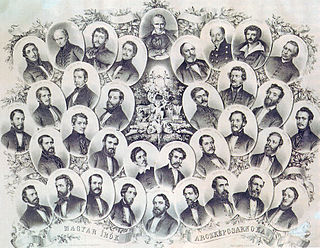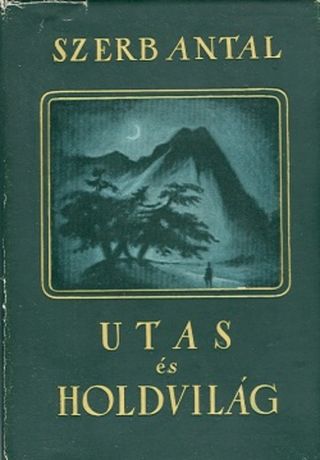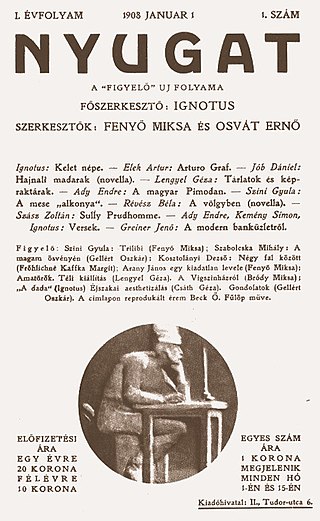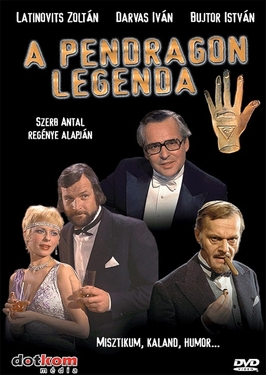
Uther Pendragon (Brittonic), also known as King Uther, was a legendary King of the Britons and father of King Arthur.

The Sword in the Stone is a 1938 novel by British writer T. H. White. First published by Collins in the United Kingdom as a stand-alone work, it later became the first part of a tetralogy, The Once and Future King. A fantasy of the boyhood of King Arthur, it is a sui generis work which combines elements of legend, history, fantasy, and comedy. Walt Disney Productions adapted the story to an animated film, and the BBC adapted it to radio.
Pendragon or Pen Draig, is the epithet of Uther, father of King Arthur in the Matter of Britain in medieval and modern era and occasionally applied to historical Welsh heroes in medieval Welsh literature such as Rhodri ab Owain Gwynedd.

Hungarian literature is the body of written works primarily produced in Hungarian, and may also include works written in other languages, either produced by Hungarians or having topics which are closely related to Hungarian culture. While it was less known in the English-speaking world for centuries, Hungary's literature gained renown in the 19th and 20th centuries, thanks to a new wave of internationally accessible writers like Mór Jókai, Antal Szerb, Sándor Márai, Imre Kertész and Magda Szabó.

Antal Szerb was a noted Hungarian scholar and writer. He is generally considered to be one of the major Hungarian writers of the 20th century.

Pushkin Press is a British-based publishing house dedicated to publishing novels, essays, memoirs and children's books. The London-based company was founded in 1997 and is notable for publishing authors such as Stefan Zweig, Marcel Aymé, Antal Szerb, Paul Morand and Yasushi Inoue, as well as award-winning contemporary writers, including Andrés Neuman, Edith Pearlman, Ayelet Gundar-Goshen, Eka Kurniawan and Ryu Murakami.

Journey by Moonlight is a 1937 novel by Hungarian writer Antal Szerb. It is among the best-known novels in contemporary Hungarian literature. According to English literary critic Nicholas Lezard, it is "one of the greatest works of modern European literature [...] I can't remember the last time I did this: finished a novel and then turned straight back to page one to start it over again. That is, until I read Journey by Moonlight."

Béla Hamvas was a Hungarian writer, philosopher, and social critic. He was the first thinker to introduce the Traditionalist School of René Guénon to Hungary.

The Faculty of Arts of the University of Szeged.

Nyugat, was an important Hungarian literary journal in the first half of the 20th century. Writers and poets from that era are referred to as "1st/2nd/3rd generation of the NYUGAT".

Međa is a village located in the Žitište municipality, in the Central Banat District of Serbia. It is situated in the Autonomous Province of Vojvodina. The village has a Serb ethnic majority (88.65%) and its population numbering 1,155 people.
Len Rix is a Zimbabwe-born translator of Hungarian literature into English, noted for his translations of Antal Szerb's Journey by Moonlight and The Pendragon Legend and of Magda Szabó's The Door and Katalin Street.
Oliver VII is a 1942 novel by Antal Szerb. The first English translation was published in 2007. In the book, the restless ruler of an obscure central European state plots a coup d'état against himself and escapes to Venice in search of ‘real’ experience. There he falls in with a team of con men and ends up, to his own surprise, impersonating himself. His journey through successive levels of illusion and reality teaches him much about the world, about his own nature and the paradoxes of the human condition.
Big Read is the Hungarian version of the BBC Big Read.
Pendragon is a Welsh word meaning "head dragon".

Peter Hargitai is a poet, novelist, and translator of Hungarian literature.

The Pendragon Legend is a 1974 Hungarian thriller film directed by György Révész and starring Zoltán Latinovits, Iván Darvas and Teri Tordai. It is based on the 1934 novel The Pendragon Legend by Antal Szerb. It was shot at the Hunnia Studios in Budapest.

16th District is the 16th district of Budapest, Hungary.
Júlia Goldman is a Hungarian author, mathematician, teacher and programmer. She writes under the pseudonym J. Goldenlane. Goldenlane is a popular fantasy author in Hungary. She had a strong influence on the Hungarian sci-fi and fantasy generation that started in the 2010s.
Antal is a Hungarian given name that is a form of Antonius in use throughout Hungary and in parts of Romania. Notable people with this given name include the following:













